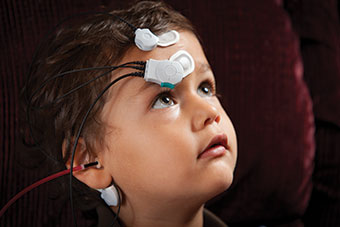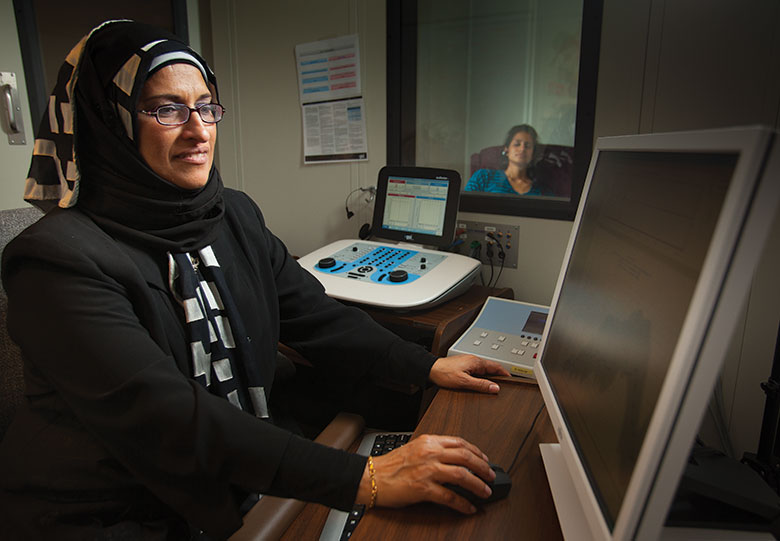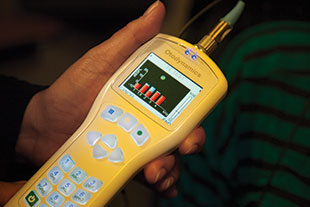Did you hear? Students offer free screenings
Dr. Wafaa Kaf, a professor of audiology from Al Sharqia, Egypt, has spent many of her 10 years at Missouri State researching ways to evaluate the hearing of these challenging populations.
Kaf is most interested in detecting mild degrees of hearing loss using “electrophysiological measures” — ways to assess hearing that don’t rely on patient response, but instead objectively track the brain’s responses to sounds. She may use electrodes placed on a patient’s head or probes inserted into a patient’s ear.
Why hearing screenings matter

Luke Wilson, 3, is given a hearing screening by Dr. Wafaa Kaf. The electrodes measure his brain’s responses to sounds.
Kaf said hearing loss is a substantial problem that is largely hidden, and estimates that there are 35 million American children and adults with mild, moderate or severe hearing loss. They may experience no symptoms, or just have slight ear pain or an ear infection that resolves quickly.
However, hearing damage lasts forever.
“Hearing is one of the most important things for children because it is the precursor for them to develop the ability to talk,” Kaf said. Hearing loss may lead to stunted speech-language development, making these children feel less competent and confident when they reach school.
These students may be held back academically and socially due to a problem they cannot control and may not even know about.
Addressing the community problem
Kaf started a service-learning pediatric audiology class for doctoral students in 2005. With her supervision, students perform free hearing and middle-ear screenings for low-income and underserved populations. Since the start of the class, she and her students have screened more than 400 children in the Ozarks.
The audiology students take portable equipment to community partner organizations. There, they screen their subjects — who are typically 6 months to 5 years old — with the consent of the children’s parents or guardians.
Afterward, Kaf supervises her students as they write a report to parents. If hearing problems or an ear infection were detected, they recommend a rescreen, a visit to a pediatrician or a complete audiologic evaluation.
Kaf’s dedication to serving others doesn’t stop there. She often tells parents to bring their child to her lab at the Missouri State Speech, Language and Hearing Clinic. This clinic has the extensive, nonmobile equipment needed for a full evaluation. She either supervises a graduate student or does the evaluation herself.
All of this is provided at no cost to the parent. Kaf guesses this service-learning class has saved parents in the community thousands of dollars.
“It’s an intensive workload, but I feel I am their advocate. These are parents who are in the most need of that service for their children.”

Dr. Wafaa Kaf works in the audiology lab. Kaf has spent many of her 10 years at Missouri State researching ways to evaluate the hearing of challenging populations.
Advancing the audiology profession
Kaf and her students are assisting not just the community — they are helping audiology experts.
Since every child is different, audiologists need many tactics to ensure accurate screenings. Kaf and her students investigate innovative, objective ways to detect mild degrees of hearing loss and methods to weed out unreliable responses.
She and her colleagues have published their research in national and international journals for audiology professionals.
Her next study takes place in U.S., Egypt

This instrument offers an objective, painless way to measure otoacoustic emissions, echoes from within the inner ear.
Kaf is taking a sabbatical in fall 2013 for a pilot study on detecting mild hearing loss in young children. She started the study in the Ozarks and will continue it in Egypt, her home country.
“With our traditional measures, mild hearing loss is often missed. We detect it later, when the child starts to behave like he cannot hear everything or when he does not quite have age-appropriate speech and language development — but this is too late,” she said.
“I want to advance the testing protocol for newborn hearing screenings so we can detect mild hearing loss as early as possible.”


One Response